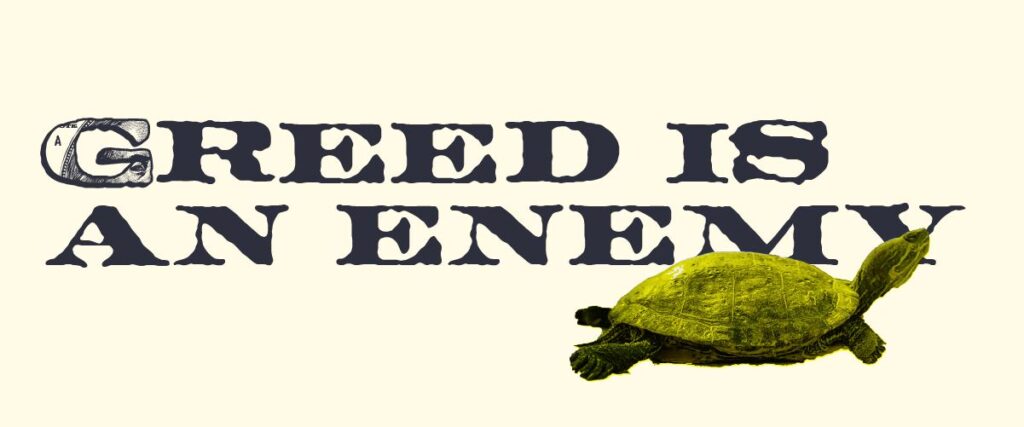
Greed is idolatry. It stems from valuing created objects wrongly. Whereas true satisfaction comes only from knowing God (John 17:3), the greedy person seeks it in ‘things’.
Greed is an enemy. Like all enemies, it is not after our wellbeing and so we must resist it.
Gehazi, Elisha’s servant, lost his place and health on account of it (2 Kings 5). Greed cost the rich, young ruler the blessings of Christ’s kingdom (Matthew 19:16-22). Saul’s greed also cost him his kingdom and God’s favour (1 Samuel 15). Demas neglected the cause of the gospel because he loved earthly pleasure (2 Timothy 4:10).
How then can we fight this enemy?
Cultivate Love for God
In Psalm 119:36, the psalmist cries:
Give me an eagerness for your laws rather than a love for money! (NLT)
Writing centuries ago, the African pastor and theologian Augustine (354-430AD) remarked that the human heart is made to seek after God. When we fail to do this, our hearts will gravitate towards other things, including money, sex, and pleasure. The solution is to pursue God passionately. The psalmist also compared his longing for God to a deer panting after water (Psalm 42:1). It should be as vital to us as our daily dependence on food and water. In his letter to the Colossians, Paul encouraged the believers:
Since, then, you have been raised with Christ, set your hearts on things above, where Christ is, seated at the right hand of God. Set your minds on things above, not on earthly things. (Colossians 3:1,2)
The antidote to sinful desires is to nurture godly ones.
Pursue Contentment
According to Paul, godliness with contentment is great gain (1 Timothy 6:6). In a world desperate for financial security, he proclaims that contentment is akin to wealth. It gives a return far higher than the most skillful investment. So instead of hustling for the next dollar, Paul calls us to pursue contentment intently.
The English pastor Jeremiah Burroughs (1599-1646) wrote:
“Christian contentment is that sweet, inward, quiet, gracious frame of spirit, which freely submits to and delights in God’s wise and fatherly disposal in every condition. Contentment is a state of being satisfied with all that God is and has promised us, and so it excludes gloominess and murmuring. A contented person would still have goals or desires. He would still have plans for growth or advancement. But he is not anxious over what he lacks or is yet to attain.”
The contented person has learned, like a ‘weaned child,’ to ‘calm and quiet his soul’, and ‘hope in the Lord’ (Psalm 131). Reflecting on this passage, Tim Keller observed:
“If grace has really changed our hearts, we don’t ultimately care if life goes the way we want it, as long as we have him…A “weaned child” is not just someone who knows this in principle, but who has worked gospel truths into his or her soul as spiritually sensed realities. Internally, this quiets the soul into profound contentment and poise.”
Depend on God
One lesson which God sought to instill in the Israelites was trust. They were to believe he would take care of their needs. If he could provide food from the sky during the wilderness journey, how would he not meet their needs afterwards? Yet, they consistently failed in this. We are not so different today.
At the root of greed is unbelief. Unbelief in God’s goodness, sufficiency, and love. We know he has promised to never leave nor forsake us (Hebrews 13:5), yet we don’t believe it. So we do all we can to get more, and more, and yet more. Perhaps we can secure our future through our own efforts. We end up building our security not on God, but on ourselves.
To help cultivate dependence in God, we should learn to give. The cheerful giver has learned to trust that ‘God is able to make all grace abound’ to him, such that he has enough at every point (2 Corinthians 9:8). Christ’s assurance further points to this:
But if God so clothes the grass of the field, which today is alive and tomorrow is thrown into the oven, will he not much more clothe you, O you of little faith? Therefore do not be anxious, saying, ‘What shall we eat?’ or ‘What shall we drink?’ or ‘What shall we wear?’ (Matthew 6:30,31)
When we give to the work of the gospel and the needs of others, we are confessing our independence from our money or possessions. We proclaim the Lordship of Christ over even our resources.
And that is crucial in fighting greed.
Dayo is a Christian writer based in Lagos, Nigeria. He has a vision of seeing Africa transformed through the Christian worldview. And he pursues this through a teaching and publishing website, The Christian Mind. Dayo is married to Omolade and they have one son.
